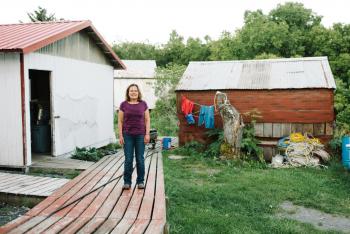Jane Petrich

West Side Stories
These oral histories chart the personal stories of individuals with a longtime connection to the west side of Kodiak Island, defined for the scope of this project as the area buffeted by the Shelikof Strait that stretches from Kupreanof Strait south to the village of Karluk. The project endeavored to create historical primary source material for a region that lacks substantive documentation and engage west side individuals in the creation of that material.
Jane Petrich was interviewed by Anjuli Grantham on August 1, 2015, in Farside, Larsen Bay, Alaska, as part of the Kodiak Historical Society’s West Side Stories project. Jane was born in Seattle and grew up around boat building and fishing, spending her college summers working in canneries in Bristol Bay. She moved to Kodiak to work at Larsen Bay Cannery in 1971 and recalls the party atmosphere of the time. After teaching for a number of years, she and her husband bought their first setnet fishing permit in 1978. She describes the challenges of learning to fish without prior experience and of raising young children in the area. She talks about more actively participating in the management process with Fish and Game and getting a grant for ice machines for setnetters in Larsen Bay. She also reflects on how the relationship between cannery and village is less personal than it once was, explains the lifestyle and family orientation of choosing setnetting over seining, and recalls her experiences fishing with her children and extended family.
Please Note: The oral histories in this collection are protected by copyright and have been created for educational, research and personal use as described by the Fair Use Doctrine in the U.S. Copyright law. Please reach out Voices@noaa.gov to let us know how these interviews are being used in your research, project, exhibit, etc. The Voices staff can help provide other useful resources related to your inquiry.
The NOAA mission is to understand and predict changes in climate, weather, oceans, and coasts, to share that knowledge and information with others, and to conserve and manage coastal and marine ecosystems and resources. The Voices Oral History Archives offers public access to a wide range of accounts, including historical materials that are products of their particular times, and may contain offensive language or negative stereotypes.
Voices Oral History Archives does not verify the accuracy of materials submitted to us. The opinions expressed in the interviews are those of the interviewee only. The interviews here have been made available to the public only after the interviewer has confirmed that they have obtained consent.
